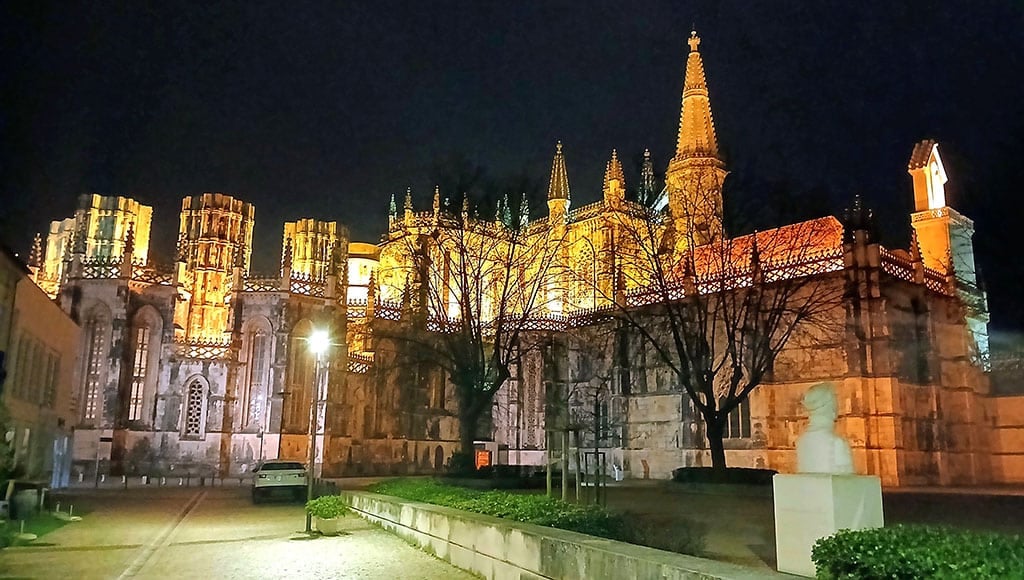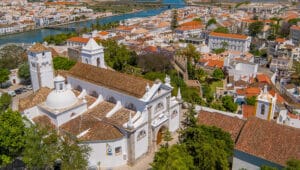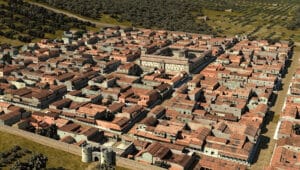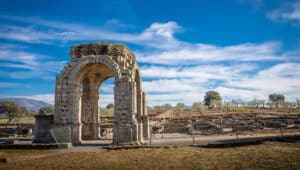In my native UK, there’s a town called Battle, which commemorates the Battle of Hastings where, in 1066, (as most schoolchildren of my era would know) England’s King Harold famously took a lethal arrow to the eye, making Norman conqueror William the new monarch.
It turns out that Portugal has a battle town too, Batalha, which has Portuguese children similarly rapt and regaled on account of the legendary conflict that it celebrates, and the strong feelings of national pride it can still evoke.
Batalha, the town in the Leiria district, near Fátima, Alcobaça and Leiria city, distinguishes itself as a glorious road-trip moment, when you are driving along the country’s N1 principal route. Suddenly, a magnificent edifice appears to rise up from the highway, as if you might suddenly be attending a drive-through mass; a sudden introduction to a literally monumental monastery, and a delicious and comprehensive serving of Portuguese history, should you happen to be passing and in need of cultural nourishment.
And it was here that I found myself last weekend, a guest of Expats Portugal, for one of their meetup weekends in the company of other wide-eyed and open-mouthed foreigners, who rose up to honour the Batalha-cry, as it were. On this joyful occasion, it was an entirely peaceful gathering of nations, including UK, USA and Mexico, unlike the encounter from which Batalha takes its name and inspiration.
In 1385, in less friendly circumstances, the ancestors of our Portuguese hosts met and defeated Castilian invaders, at the Battle of Aljubarrota, in the summer of that fateful year – ably assisted by English warriors, I can proudly add.
Aljubarrota is renowned as an against-the-odds victory, where an army of just 7,000 Portuguese defeated 30,000 ‘Spaniards’, in just 30 minutes, thanks to the strategic genius of one Nuno Álvares Pereira, whose equestrian statue now stands proudly upon Batalha’s breathtaking concourse.
In his shadow was our meeting point for the weekend, between our superb overnight lodgings and the monastery itself, where top tour guide and good friend of the Good Morning Portugal! Show, Filomena Pascoal, soon began educating us – once our ‘NIF’ numbers had been handed over to enable free entry to this jewel in Portugal’s well-endowed heritage crown.
We learned, among many wonderful and interesting things, that the Aljubarrota victory confirmed ‘João Primeiro’, of Aviz, as the uncontested King of Portugal, with the closeness between Portugal and England not only leading to a permanent military alliance, namely the ‘Treaty of Windsor’, but also an English bride for the King – Philippa of Lancaster, in 1387. She would go on to bear children known as ‘The Illustrious Generation’ including, notably, Duarte (Edward) who became the 11th King of Portugal, and his brother Prince Henrique, AKA ‘Henry the Navigator’, the venerable explorer, now entombed here, where we stood.
Here, in one of the best, original examples of ‘Late Flamboyant Gothic’ architecture, blended with the Manueline style, in all of Portugal, we also saw the poignant tomb of the unknown soldier (Túmulo do Soldado Desconhecido), honouring the fallen generally and containing specifically the bodies of two World War I soldiers – buried there in 1921. We witnessed the changing of the guard of these, who made the ultimate sacrifice, within the hallowed, deeply historical and brilliantly-hewn stones that took over a century to design and arrange, over the reign of seven kings.
Standing like a stoic witness to Portugal’s changing fortunes, the Monastery was damaged by the 1755 earthquake, even this distance from the epicentre. And so too, by Napoleonic troops, ravaging and ransacking the site in the early 19th century.
After some years in ruins, King Ferdinand II of Portugal began a restoration program in 1840, saving this great Gothic legacy, where restoration would continue into the early 20th century, being declared a National Monument in 1907. 1980 saw it become a museum and, ultimately, a UNESCO World Heritage site in 1983.
On one level, this gathering could have been a mere “been there, got the fridge magnet” visit, which incidentally would be no bad thing. But it turned out to be so much more than that, with not only a chance to dwell in an atmosphere that could be gently sipped, rather than gulped, but also to enjoy the company of similarly impressed and excited immigrants, all keen to see and inwardly digest a place of great significance in Portugal’s rich history.
Add to this my delight in taking the non-toll country roads to be there; seeing the quieter side of life in central Portugal not far from home, yet new and enchanting to me, even after my several years here.
I love these lesser used routes that seem forgotten, time-capsule-like, with abandoned but clearly well-used and previously-loved buildings, and a few remaining locals who never moved on or away after their locale’s heyday.
The weekend, as well as giving me a profound connection with Portugal’s past, also showed me the sparkle of Portugal’s present time, where, alongside the ancient, are modern, thriving businesses that acknowledge and trade on the past, whilst giving the best in contemporary, world-class hospitality.
Among them, our home for the night – the Hotel Lis Batalha, a proudly independent and beautifully-run venue, revelling in its location but so unlike the corporate dormitories that you can find, and feel like you could be anywhere in the world.
And on the other side of the Gothic grandeur, the Burro Velho restaurant and bar, with its hipster staff, unparalleled selection of booze, and elegant clientele who have been drawn in, like moths to a friendly flame from far afield – where I enjoyed a single malt nightcap, before stepping out to a dramatically-lit monastery on my way to bed for the night.
No great Portuguese weekend would be complete, I’m certain, without a traditional family lunch, and Expats Portugal’s Astrid found us the perfect climax to our ‘Batalha bash’. Less than 10 minutes from the town centre, we joined multi-generational Portuguese families, as they, like us, sat down to a tremendous Sunday meal at the O Casarão restaurant in Azoia, featuring garoupa and prawn skewers with açorda and migas as the culinary highlight for me. This weekend had it all, and I can’t wait for the next. Thank you, Portugal! Thank you, Expats Portugal!
Sign up for the next weekend in Coimbra here – https://expatsportugal.com
Book a tour with Filomena Pascoal – trips4brits@gmail.com
By Carl Munson
Carl Munson is host of the Good Morning Portugal! show every weekday on YouTube and creator of www.learnaboutportugal.com, where you can learn something new about Portugal every day!




















